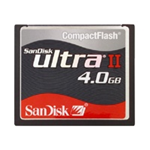CompactFlash
 CompactFlash is a small form factor mass storage device. The Flash Memory-based card weighs just half an ounce. They provide complete PCMCIA-ATA functionality and compatibility. CompactFlash cards are designed with flash technology, a nonvolatile storage solution that does not require a battery to retain data indefinitely. The CompactFlash card specification version 4.1 supports data rates up to 133MB/sec and capacities up to 137GB.
CompactFlash is a small form factor mass storage device. The Flash Memory-based card weighs just half an ounce. They provide complete PCMCIA-ATA functionality and compatibility. CompactFlash cards are designed with flash technology, a nonvolatile storage solution that does not require a battery to retain data indefinitely. The CompactFlash card specification version 4.1 supports data rates up to 133MB/sec and capacities up to 137GB.
CompactFlash cards support both 3.3V and 5V operation and can be interchanged between 3.3V and 5V systems. This means that any CF card can operate at either voltage. Other small form factor flash cards may be available to operate at 3.3V or 5V, but any single card can operate at only one of the voltages.
CompactFlash storage products are solid state, meaning they contain no moving parts, and provide users with much greater protection of their data than conventional magnetic disk drives. They are five to ten times more rugged and reliable than disk drives including those found in PC Card Type III products. CF cards consume only five percent of the power required by small disk drives.
The connector used with CF and CompactFlash is similar to the PCMCIA Card connector, but with 50 pins. Years of field experience in portable devices have proven the reliability and durability of this connector in applications where frequent insertions and ejections of the card are required. Other small form factor flash cards use connector technology that is not reliable or durable in these applications.
CompactFlash technology is developed and overseen by the CompactFlash Association (CFA).

